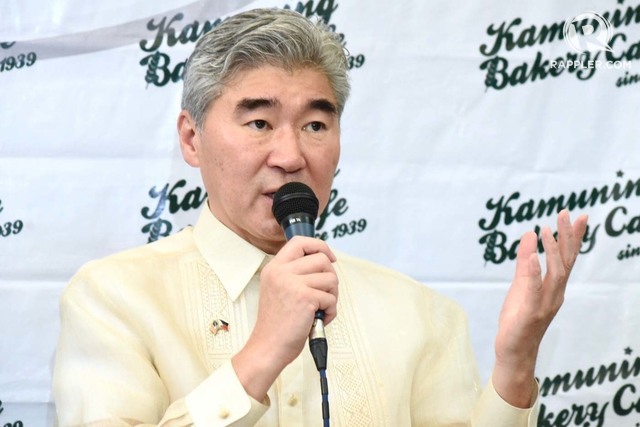US Ambassador Sung Kim stresses Washington's 'serious concerns' about Chinese firm Huawei, which will be involved in the Department of the Interior and Local Government's China-funded Safe Philippines project.

United States Ambassador Sung Kim on Thursday, May 23, reiterated his country's concerns over Huawei technology, even as he said it's up to the Philippine government to decide if it would allow the controversial Chinese firm in its Safe Philippines surveillance project.
"In the end, it's up to the individual country to make decisions, which countries they partner with, which technologies they choose to use but we believe it's important, as a friend, as a partner, as an ally to share our concerns with the Philippines and other partners in the region and beyond," he said during a forum in Quezon City on Thursday.
He was asked what possible impact the US sees in the involvement of the Chinese firm in the 12,000-camera surveillance project of the Department of the Interior and Local Government (DILG), dubbed "Safe Philippines." (READ:Senators sound alarm over China-funded DILG surveillance project)
The P20-billion Safe Philippines project involves a video surveillance system linked to a dedicated communications infrastructure with command centers in 18 Philippine cities. It aims to lower crime rates and improve response time to emergencies. The DILG has partnered with China International Telecommunication and Construction Corporation (CITCC) and Huawei for the project.
On May 16, President Donald Trump effectively barred Chinese telecom giant Huawei from the US market, under an executive order that prohibits the purchase or use of equipment from companies that pose "an unacceptable risk to the national security of the United States or the security and safety of United States persons." (READ: Trump ramps up battle vs Huawei)
On Thursday, Kim explained why it was important for the US to share its concerns about Huawei with its allies.
"We have very serious concerns and we think it's appropriate for us to share our serious concerns with our partners and friends in the Pacific region and beyond," said Kim, emphasizing that other countries and experts have reached similar conclusions about Chinese technology.
"All we want to do is make sure countries in the region know the serious risks at stake in dealing with such companies and technologies," he added.
Kim, however, said he had yet to personally raised the issue of Huawei technology with President Rodrigo Duterte.
"No, I have not talked to him especially about that issue," he told Rappler.
Duterte and Chinese President Xi Jinping had witnessed the signing of the agreement on the Safe Philippines Project during Xi's state visit in November 2018.
The Philippines' own Department of Foreign Affairs (DFA) had warned the Duterte government about the risks of partnering with Huawei for government projects, citing restrictions placed on its technology by other countries.
US Secretary of State Mike Pompeo used his March visit as an opportunity to warn the Philippines against Huawei 5G technology, again citing security risks.
He had said the presence of Huawei technology in the Philippines may prevent the US from operating its own equipment there.
"America may not be able to operate in certain environments if there is Huawei technology adjacent to that," Pompeo had said.
https://www.rappler.com/nation/231360-us-ambassador-statement-huawei-role-dilg-surveillance-project-philippines-decision

No comments:
Post a Comment
Note: Only a member of this blog may post a comment.